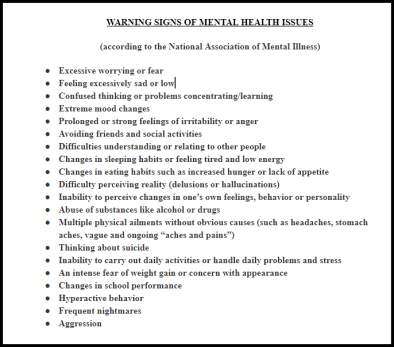A new Mental Health Awareness Club has been started by a senior student with a personal interest in the issue. The club meets every Monday from 3:15 p.m. to 4:00 p.m. in room 313 of Founder’s Hall. All Cabrini students are welcome to attend the meetings.

Founder Renin Broadnax, a senior digital communications and social media major, saw a need for some kind of community support at Cabrini for students suffering from mental health issues. Recent research supports his conclusion: from 2007 to 2018, suicidal thinking, depression and self-injury rates among college students have more than doubled. Suicide rates in colleges have also doubled, with the rate for young men rising to twice the rate of young women.
“I started this club because personally I’ve struggled with a lot of mental health [issues] before even coming to college. . . but especially when I got to college, my mental health started to decline, and there was a lot of extra stress,” Broadnax said. “The need for not only community support but faculty support and mental health professional support is on the incline, and I feel like especially at colleges and Cabrini included. We do not have enough mental health support.”
Broadnax, the club president, recruited three other executive board members to form the club. They are Nuresebah Alkadir, a junior psychology and political science major; Emma Turnbach, a senior psychology major and philosophy minor; and Chardanay White, a senior double major in political science and history. All share Broadnax’s interest in mental health awareness.
“I think mental health is something that we should talk about more,” Turnbach said. “I think my own experiences with mental health at Cabrini wanted me to provide a safe space for people to feel like they can talk to other people about whatever they’re experiencing.”
The mission of the Mental Health Awareness Club is to bring together the student community to talk about mental health issues, as well as to promote inclusiveness, since mental health issues have long carried a stigma. All the members emphasize that they are not mental health professionals and the group’s purpose is not to provide counseling. That role is filled by the Counseling and Psychological Services center, or CAPS, which provides free counseling to Cabrini students. The Mental Health Awareness Club adds the dimension of community support.
A typical meeting includes sharing highs and lows from the previous week.
“We start our meetings off with a journal entry,” Broadnax said. “I gave out journals for everyone and they write about their day. They write ‘three Ups three Downs,’ and then we summarize our week and then we start off by just cleansing the week. That’s why we meet on a Monday.”
The club also spends time planning awareness activities. They recently partnered with the Body Image Coalition, another campus group, to make post-it notes with positive messages, which were left around campus for people to take. In addition, they hope to host a mental health awareness week as well as participate in Philadelphia area walks for mental health issues. The group is intended not only for those struggling with mental health issues; it is also for those who want to know more about how to take care of themselves under stress, how to recognize warning signs in their loved ones and peers (see Warning Signs sidebar), and how to talk to them about it.
“I think being more aware about things in the mental health awareness realm can make you a more empathetic person, and it doesn’t matter if you have not experienced it, someone else in your life might be and pushing yourself to learn more about these topics can really help you grow as a person,” Turnbach said.
Alkadir points out that everyone is vulnerable to stress during the college years.
“A lot of us juggle work, school, extra activities on campus, then also personal time with family and friends, and then a lot of us forget that we need to have our own time as students,” Alkadir said. “We forget that we also need to take a day for ourselves, take a break from school work, and everything else and just try to focus on [ourselves].”
The signs of mental health issues can be different in each individual, but when a person observes enough signs to cause concern, he or she may not know how to talk to a friend or loved one.
“If it’s thoughts of self-harm, I would definitely report it to a mental health professional.We are not equipped to deal with thoughts such as that,” Broadnax said. “Sometimes people are just speaking to you because they love you and they want someone they love to know about it. They’re not asking you for all the answers, but just asking you to be a listening ear.”
Turnbach stresses that talking to someone about your concerns should be approached respectfully.

“I think often times is it is suggested that you approach that person with an understanding and empathetic attitude, and say things like, ‘I noticed you haven’t been yourself lately. Is there anything I can do? Is there anything you’d like to talk about?’” Turnbach said. “A lot of people have a hard time opening up to just anyone. So if you were to say, ‘I know that I feel like I’ve been struggling these past few weeks. How do you feel about your situation?’ And then maybe that could start a discussion about seeking help. . . . I think it all starts with approaching that person in a non-threatening way.”
Broadnax points out that, while many people think they are alone in what they are feeling, that is not the case.
“I felt isolated in high school and even in middle school, I felt like, why am I the only one going through this? Why can’t I just be normal? But then I found out when I got to college that this is normal for a lot of people; it’s not just you experiencing these isolated feelings,” Broadnax said. “So what turned me into an advocate is, I don’t want anyone else to feel like I felt when I was going through it alone.”
The Counseling and Psychological Services Center (CAPS) is located in Room 174, Grace Hall, and is open Monday-Friday from 9 a.m. to 4 p.m. Walk-ins are welcome between noon and 1 p.m.


